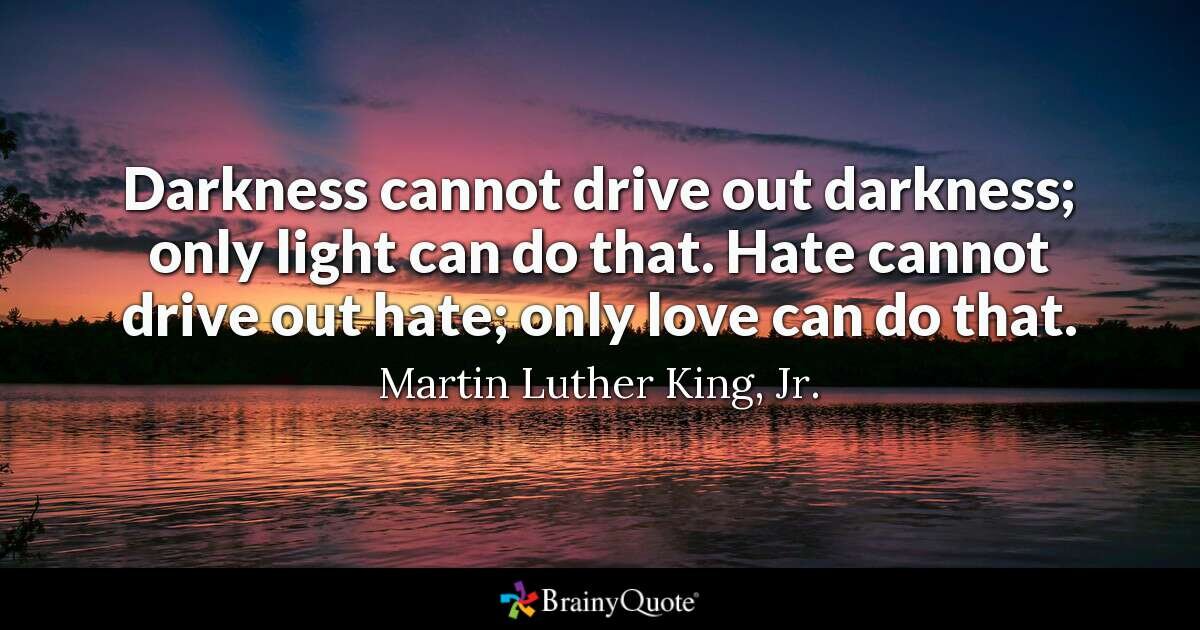This is the season when nostalgia can easily trigger the sensation of regret. Regretting can be complicated, for sure. The inner critic sometimes makes it into a story about what’s wrong with us or how foolish we are. It will use regret as proof that we’re not good enough. It might be helpful to separate the workings of the inner critic from the voice of regret—pull them apart, so to speak. …
Read moreUncertainty during this post-election time
Not all roads in life are smoothly paved, as we know. Some are muddy or gravelly or have huge ditches. Sometimes trees have fallen across them or there are live wires nearby. These challenging times can become part of the inner voice that reminds us that bad things happen.
This same voice tells us that terrible things will probably continue to happen, and this worry pushes us to figure out how we can try to prevent them. It’s how the brain’s negativity bias works. …
Read moreRacism and Innocence
To introduce this article written by Roxy Manning, PhD, I’d like to share a short story about racism and innocence.
Many years ago, I was at the General Assembly for the Unitarian Universalist Association (UUA). The speaker that day was Rev. Rebecca Parker, who was at that time president of the UUA. During her talk, she shared an experience she had while attending a conference on racism.
In one of the workshops, the two presenters, both African American women historians, spoke about the political history of Black women in the United States. …
Read moreA helpful reminder during election season
A few days ago I received a newsletter from Rick Hanson, PhD entitled “Feed the Wolf of Love.”
It provides a helpful reminder (especially during this election season)…
Read moreAwe & inspiration
I’d like to share a recommendation from my dear friend, Eliza: To Be In Awe— WISDOM from a 96-year-old. This film features Dot Fisher-Smith, an elder from Ashland, Oregon. She's invited to speak about her life today, and I think she does this with a great deal of beauty, calm, and awe. …
Read moreStories we tell ourselves
Photo by @tangerinenewt on Unsplash
Today I’m passing along a link to a podcast I came across and often revisit: People I (Mostly) Admire.
This episode in particular—Pay Attention! (Your Body Will Thank You)—was eye-opening because it helped me realize how I’ve been carrying around various stories blocking me from seeing who I truly can be.
In this case, it was my experience of being 70 years old. I didn’t realize I’d told myself a story about being 70—about what happens when you’re this age, i.e., “It’s all downhill from here,” and how life will get progressively harder. …
Read moreA poem for our times
I was going through some of the newsletter articles we’ve collected on our website when I came across this poem,: “Peace is This Moment Without Judgment,” by Dorothy Hunt, which is worth sharing again.
Peace is this moment without judgment. So, without expectations and blame. Without shoulds, have-to’s, and musts. And without trying to be something I am not.
In this poem, the poet tells us that the heart space is the place where everything is welcome. This can be challenging because not everything that arrives here is happy and wonderful. …
Read moreThe one-hour vacation
A few weeks ago, I wrote about how the dictum “work before play” made sure that “everyday needs” would win out over my needs for fun and play nearly every time. Once I realized this, I immediately saw this “work ethic” as a self-limiting belief, and I set about to make a change.
It’s been fun! It’s also been very eye-opening. …
Read moreWhen unmet needs become demanding
When you have a need that you are seeking to meet but the seeking becomes insistent, like a demand, what then? This is what I’ve experienced.
The negative energy (and the stories I tell myself) that go with an unmet need creates a kind of hypervigilance—an intensity about getting the need met, and a fearfulness that it won't be.
I become attached to a particular outcome. …
Read moreLove letters
Several weeks ago, I ran into a YouTube video from Elizabeth Gilbert, the author of Eat Pray Love. In this video, she invited viewers to join her in her practice of writing letters to Love. I decided to try this. Here is one of my letters and Love’s response.
Read moreDear Love,
Please tell me about my daughter and about being sad. …
Breaking a rule
Breaking a Rule
Earlier this year I wrote an article for the newsletter that shared the needs I most want to meet this year: fun, curiosity, vitality, adventure, awe, and play, and how I want to meet them. This morning I’ve realized how easy it is to let the day go and not include them—that doing the things I would most love to do has been second in line to the things that just need doing. In a weird way, it’s like putting myself second. Oof!
What I want to do is to safeguard these needs from getting lost. I thought, “Well, maybe I can put notifications on my phone.” I could tell right away that this would trigger a have-to approach in responding to any of them.
Then I wondered, “Why are my needs for fun and delight taking second place?” …
Read moreIf you can’t do it all, what about doing a little bit?
As 2023 has come to a close and 2024 opened its doors, I’ve been giving consideration to what I want for this coming year. I know many people think about this as setting a New Year’s resolution, but as my friend Genevieve says, “That can be tricky.” If we’re not careful we can easily set a perfectionistic goal instead of one that’s doable. Because I too am a recovering perfectionist, this is something I want to avoid.
I’d been mulling this over when another friend, Suz, told me how she would answer this question. She said instead of focusing on a fixed goal she might ask herself, “For this new year, what needs do I have that continue to remain unmet?”
This got me thinking. What are my needs for the new year? What are the first steps? And how will I know when they’re met? For me, there’s a lot of flow, ease, and permission-giving in approaching the big question this way. So, I decided to give it a try, and I’d like to share my answers with you. …
Read moreSanctuary
Many years ago, I had just returned home from work, and right away I was mad at my daughter for not doing her homework. She asked me, “Are you mad at me or are you mad about what happened at work today?” The truth was, I was mad about work. That was what had all my attention. In that space, there wasn’t much room for, “Hi Honey, how was your day?”
In my experience, it can be difficult to have an open heart when it’s already too tired, and our focus is on what’s wrong. Neither of these conditions leaves much room for connection. This is a helpful thing to notice. Because, if we notice when we don’t want to connect, we can also notice when we need to rest and reset. …
Read moreStarting at the Beginning
Need an NVC reset? Here’s an article I wrote for the Changing Self Talk to Self Care class a few years ago that could be helpful.
“When Dr. Rosenberg recognized that judgments and blame were a significant factor in understanding violence, he saw that if we look underneath them, we can find out what is really going on. Knowing this, we could change course and find kinder, more helpful communication solutions. As a result, he developed Nonviolent or Compassionate Communication (NVC).
NVC transforms judgments (including self-judgments) by using them to find the deeper messages expressed by our feelings and needs. It has a gentle yet fierce curiosity that makes acceptance, self-care, and inner peace possible. To figure out how this works we start by looking at the four foundational principles of NVC. …”
Read moreA Lesson in Calm Confidence
Last fall Michael and I needed help with our dog Sofia. She’s a very sweet pup. However, about six months ago we had some changes at the house that really stressed her out, which of course, stressed us out too.
Here’s what we’ve learned since then. Dogs are like our mirrors. What we feel, they feel. …
Read moreThe Gift of Community
Dear NVC Friends,
I want to take a moment to tell you how meaningful being part of a practice group is for me! I heard someone say recently they spent a lot of time alone when they were younger and managed it well. And then they found and valued community. I think that’s my story too.
There’s something so very special about belonging, and in particular, belonging to this community—where we learn how to choose inquiry over blame and connection over judgments. …
Read moreUnderstanding Moralistic Judgments; Reflections for this Season of Nonviolence
Marshall Rosenberg, PhD. and the author of Nonviolent Communication: A Language of Life (NVC), made it his life-long endeavor to bring peace by helping people understand the reasons why reactivity, conflict, and most violence arise. He discovered that moralistic judgments are a significant catalyst to conflict and suffering. …
Read moreWhen You Hit a Wall
At the last practice group, there were a few people who talked about hitting a wall sometime this past week, and I was one of them. I want to share that experience with you.
The whole day long I carried this unclear but ever-present sense of anxiety. (It wasn’t because of anything in particular. My guess is that it was because of everything.) With the anxiety came restlessness and dissatisfaction. Nothing seemed interesting. I was so caught up in the discomfort it became the thing that informed everything else.
Later in the evening, I decided to flip through the photo gallery on my phone—hoping for something uplifting—and I ran across a photo of some board work I had done in one of my classes. Yes, that’s right, one of my classes: I was teaching others something that I myself had totally lost sight of all day long. Although I had already told myself I could drown my feelings by reading a book, and even though I really wanted to read the book, I thought, “You know what to do.” So I put the novel aside and got out my journal. …
Read moreHow to Cultivate More Inner Peace
Suggestions from the Tuesday Practice Group:
Leave for appointments early. Allow time so no rushing needed.
Put things in their place so when I go to find them, they are there.
Balance order with ease—what’s my balance for inner peace?
Remind myself what I have influence and control over and what I don’t. What’s mine? What’s not mine? …
From "Changing Self Talk Into Self Care": More on Working with the Inner Critic
From the Changing Self Talk to Self Care workshop
Marshall Rosenberg, in his book, Nonviolent Communication, helps us to understand how feelings of inner ease and peace arise when we “see” and accept who we are just as we are. On the other hand, when we attack ourselves with judgment, blame, shame, guilt, or threats we don’t see or accept ourselves as we are. The impact of this is its own kind of violence, yes? To help us untangle our inner criticisms we first apply these important facts to our situation. …
Read more


















